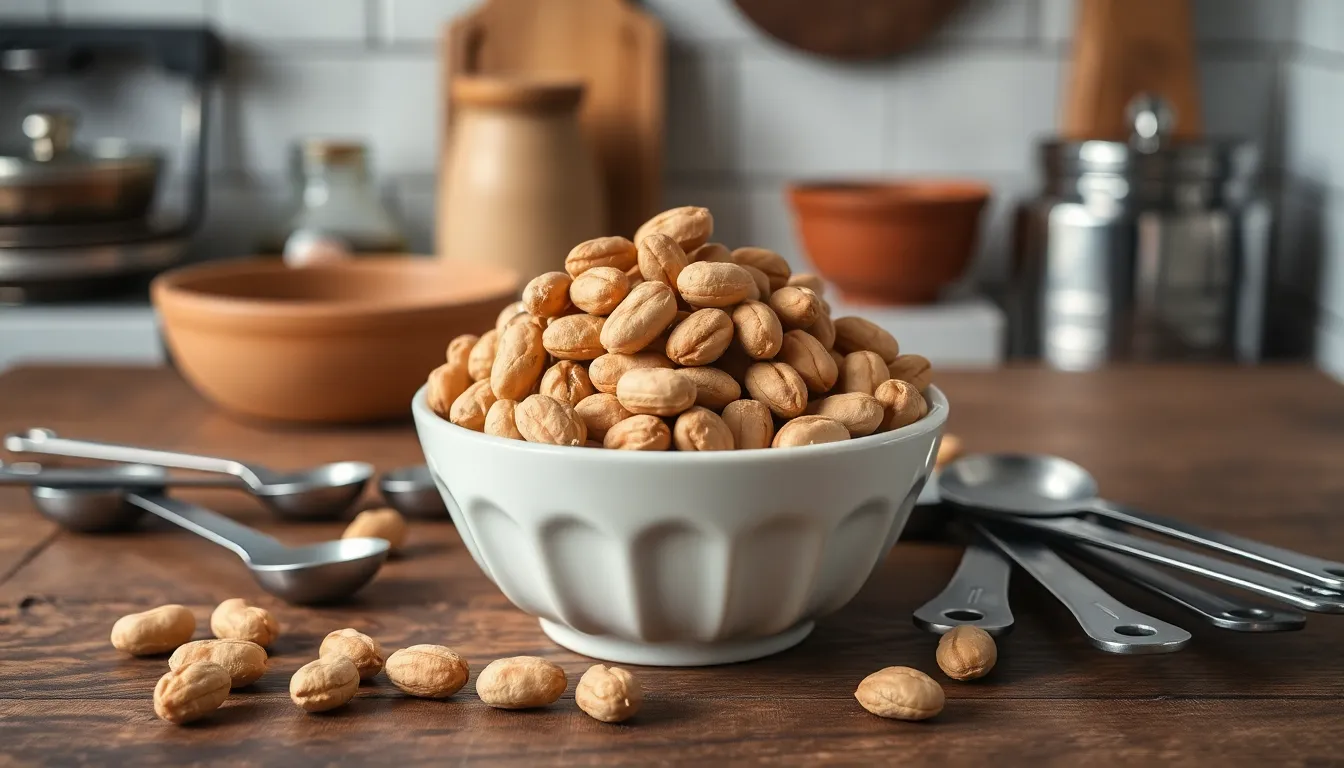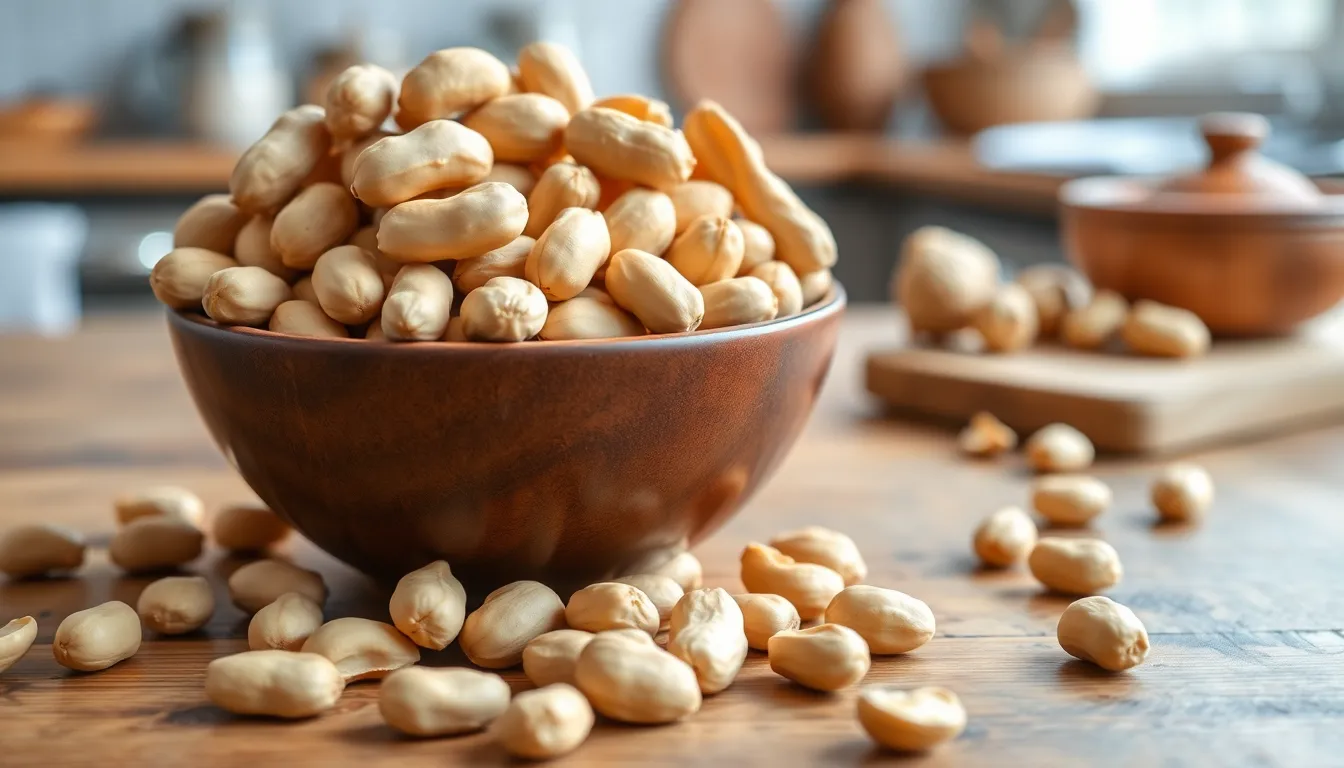Peanuts might just be the unsung heroes of the snack world. While they may not wear capes, these little legumes pack a punch when it comes to protein. If you’ve ever wondered how much protein’s hiding in that crunchy goodness, you’re in for a tasty surprise.
Table of Contents
ToggleOverview Of Peanuts And Their Nutritional Profile
Peanuts serve as an excellent source of nutrition for many people. Each serving of peanuts, approximately 28 grams, contains about 7 grams of protein. This makes them a viable option for those looking to increase their protein intake.
Rich in various nutrients, peanuts also provide healthy fats, vitamins, and minerals. They contain monounsaturated fats, which can support heart health. Additionally, peanuts supply vitamins such as E and B6, along with minerals like magnesium and phosphorus.
Fiber is another essential component of peanuts, contributing about 2 grams per serving. This aids in digestive health and promotes a feeling of fullness. Incorporating peanuts into daily diets can enhance overall nutrition without excessive calorie intake.
Peanuts also contain antioxidants, which can help combat oxidative stress in the body. Resveratrol, for instance, is one antioxidant found in peanuts, offering potential health benefits.
The versatility of peanuts adds appeal as well. They can be consumed raw, roasted, or as peanut butter, fitting various culinary preferences. People can mix peanuts into salads, smoothies, or snack trays, providing an easy way to obtain necessary nutrients.
Peanuts represent a nutrient-dense food that can contribute significantly to a balanced diet. Their protein content, healthy fats, vitamins, and minerals make them a valuable addition to meals and snacks.
How Much Protein Is In Peanuts?

Peanuts provide a significant source of protein, making them an excellent snack choice. A typical 28-gram serving delivers around 7 grams of protein, contributing around 14% of the recommended daily intake for adults. Consuming peanuts can effectively support protein needs, especially for vegetarians and those seeking healthy, nutrient-rich options.
Protein Content Per Serving
In a 28-gram serving of peanuts, 7 grams of protein stands out prominently. This protein content provides essential amino acids needed for muscle repair and overall health. Alongside protein, peanuts are also rich in healthy fats and micronutrients, enhancing their overall nutritional value. This combination promotes both satiety and energy, making peanuts a smart addition to meals and snacks.
Comparing Protein Levels With Other Nuts
When comparing peanuts to other nuts, their protein content is competitive. Almonds offer about 6 grams of protein per 28-gram serving, while walnuts contain approximately 4 grams. Cashews present roughly 5 grams of protein for the same serving size. Peanuts often emerge as a top contender among nuts regarding protein density, making them a powerful choice for anyone looking to boost their protein intake.
Health Benefits Of Protein In Peanuts
Peanuts provide numerous health benefits due to their significant protein content. A high protein intake supports various bodily functions, particularly in muscle development and weight management.
Muscle Development
Protein plays a crucial role in muscle repair and growth. Peanuts contribute about 7 grams of protein per 28-gram serving, making them an excellent source for athletes and fitness enthusiasts. Consuming peanuts after workouts may enhance recovery by supplying essential amino acids, which help rebuild muscle tissue. Moreover, the healthy fats in peanuts aid in energy production, promoting sustained performance during physical activities. Choosing peanuts as a protein source caters well to those looking to build muscle while enjoying a tasty and nutritious snack.
Weight Management
Incorporating peanuts into a balanced diet can aid in weight management due to their fiber and protein content. Each serving contains approximately 2 grams of fiber, promoting a feeling of fullness and reducing cravings between meals. The protein in peanuts also requires more energy for digestion, boosting metabolic rates slightly. Snacking on peanuts instead of processed snacks often leads to lower overall calorie intake and supports healthier eating habits. Many weight loss plans include peanuts as a satisfying option that can help maintain energy while managing caloric intake effectively.
Ways To Incorporate Peanuts Into Your Diet
Peanuts offer versatility, making it easy to include them in daily meals and snacks.
Snack Ideas
Snacking on peanuts provides a protein-rich option. Enjoy them raw or roasted for a quick energy boost. Creating a trail mix with peanuts, dried fruits, and other nuts enhances nutritional benefits. Pairing peanuts with apple slices or celery sticks adds fiber and vitamins. For a flavorful twist, mix peanuts with spices or chocolate for an enticing treat.
Recipes Featuring Peanuts
Incorporating peanuts into recipes boosts flavor and nutrition. Peanut butter smoothies deliver protein while providing a creamy texture. Stir-frying vegetables with peanuts enhances crunch and adds healthy fats. Peanut sauce complements dishes like noodles or grilled chicken, offering a delightful flavor profile. Including peanuts in baked goods, such as cookies or granola bars, creates a delicious, wholesome snack.
Peanuts are an impressive source of protein and offer numerous health benefits that make them a worthy addition to any diet. Their protein content not only supports muscle development but also aids in weight management by promoting satiety. With their versatility, peanuts can easily fit into various meals and snacks, making them a convenient option for those looking to boost their nutrient intake. Whether enjoyed raw, roasted, or as peanut butter, incorporating peanuts into daily routines can enhance overall nutrition while satisfying cravings. This makes peanuts a powerful and delicious choice for anyone aiming to maintain a balanced diet.



